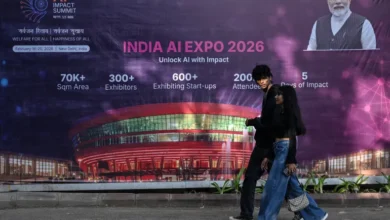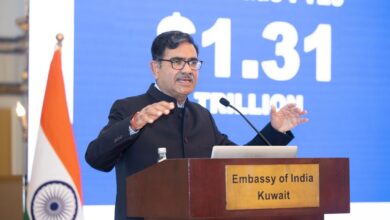India’s defence self-reliance journey hits key milestone at DefConnect 4.0

In recent years, India has made significant strides toward achieving self-reliance in the defence sector, aligning with the government’s larger vision of Atmanirbhar Bharat (self-reliant India).
With growing regional and global security challenges, India’s focus on indigenous defence innovation has become crucial for both enhancing national security and reducing dependence on foreign imports.
Through a series of strategic initiatives, policy reforms, and technological advancements, India is increasingly becoming a hub for defence manufacturing, research, and innovation.
India’s drive towards achieving self-reliance in defence technologies has gained significant momentum in recent years, with “DefConnect 4.0” serving as a key milestone in this ambitious journey.
The Indian government has made defence self-reliance a top priority, recognizing the need to reduce dependence on imported military equipment.
Over the years, India has been one of the largest importers of defence technology, but this dynamic is rapidly changing.
The government’s Make in India initiative, launched in 2014, set the stage for promoting indigenous production in critical sectors, including defence.
The goal was to encourage the domestic defense industry, comprising public sector undertakings (PSUs), private enterprises, and start-ups, to design, develop, and manufacture advanced defense equipment.
Inaugurated by Indian Defence Minister Rajnath Singh on October 7, the “DefConnect 4.0” brought together stakeholders from the armed forces, Defence Public Sector Undertakings (DPSUs), innovators, industry leaders, start-ups, and policymakers under one roof, fostering collaboration and showcasing ground-breaking indigenous technologies that promise to transform India’s defence landscape.
The fourth edition of DefConnect highlighted India’s continuous march towards “Atmanirbhar Bharat” (self-reliant India), particularly in defence manufacturing and technological advancements.
Rajnath Singh emphasized the need for India to develop innovative technologies tailored to its specific requirements while addressing global security concerns and anticipating future threats.
Speaking at the inauguration of “DefConnect 4.0” in Delhi, the defence minister reaffirmed the central government’s commitment to fully support both public and private sectors in building a robust, self-sufficient defense industry.
He underscored the significance of DefConnect 4.0 as a crucial platform that unites various stakeholders in the defence ecosystem, helping India move toward greater self-reliance.
Singh highlighted the growing role of the private sector in the defence industry, urging them to shift from merely replicating existing technologies to creating cutting-edge innovations that meet the evolving needs of the armed forces.
The event showcased the government’s vision of fostering technological advancements that ensure India’s defence sector remains at the forefront of global standards.
As part of the proceedings, the Defence Minister launched the “Acing Development of Innovative Technologies with iDEX-ADITI 2.0” challenges, alongside the 12th edition of the “Defence India Start-up Challenges (DISC 12)”.
The iDEX-ADITI 2.0 initiative presents 19 challenges from the armed forces and associated agencies, offering grants of up to Rs 25 crore (approx 29,76,347 USD) to the winners under the “Innovations for Defence Excellence (iDEX)” programme.
iDEX has been instrumental in creating a robust innovation ecosystem, enabling start-ups and MSMEs (Micro, Small & Medium Enterprises) to partner with defence organizations and develop indigenous solutions for the armed forces.
Till date, iDEX has successfully launched 11 editions of the Defence India Start-up Challenges, attracting over 9,000 applications.
It is actively working with more than 450 startups and MSMEs on key defence projects.
Since its launch by Prime Minister Narendra Modi in 2018, iDEX has provided a collaborative platform for stakeholders in the defence and aerospace sectors.
Meanwhile, DISC 12 focuses on 41 challenges spanning various key technology domains, providing grants up to Rs 1.5 crore (approx 1,78,569 USD) for innovative solutions.
The initiative is designed to promote a vibrant start-up ecosystem that can contribute to India’s defence capabilities while driving technological breakthroughs in fields such as artificial intelligence, robotics, cybersecurity, and space technology.
Singh noted that these programmes are designed to stimulate innovation, entrepreneurship, and further advance India’s goal of achieving “AtmaNirbharta” (self-reliance) in the defence sector, reinforcing the importance of homegrown technology and industry partnerships in strengthening national security.
The Indian government, under the leadership of Prime Minister Narendra Modi, has emphasized the importance of self-reliance across sectors, particularly defence.
With an eye on reducing dependency on foreign equipment and technologies, the Ministry of Defence (MoD) has been actively promoting indigenous innovation, aiming to establish India as a global leader in defence manufacturing.
“DefConnect 4.0” aligns with this vision, providing a platform to showcase the latest breakthroughs in India’s defence sector, many of which are born out of collaboration between the public and private sectors, startups, and academia.
The DefConnect series, which began in 2019, has grown into a prestigious event that celebrates homegrown defence innovations, focusing on the integration of advanced technologies such as artificial intelligence (AI), robotics, cybersecurity, space technology, and unmanned systems into the Indian military.
DefConnect 4.0 further cemented the idea that India is not just a consumer of global defence technologies but an emerging producer of cutting-edge solutions tailored to its unique defence challenges.
DefConnect 4.0 highlighted the importance of collaboration between different stakeholders in the defence ecosystem, including start-ups, public sector undertakings, and the armed forces.
Singh reiterated that such events play a crucial role in bringing together the best minds to solve India’s defence challenges and that fostering innovation through initiatives like iDEX will ensure India remains on the path to Aatmanirbhar Bharat in defence.
The government’s vision for a self-reliant defence industry is not just about reducing dependence on foreign imports but also about making India a global exporter of defence technologies.
DefConnect 4.0 provided a platform to discuss strategies and showcase cutting-edge indigenous innovations that could transform the future of India’s defence capabilities.
With the launch of iDEX-ADITI 2.0 and DISC 12, India is set to witness a new wave of defence innovation, with the potential to make significant strides toward its goal of becoming a self-reliant global defence power.
India’s journey toward defence self-reliance has been bolstered by a series of policy reforms aimed at creating a favourable environment for domestic defence production.
The government’s Defence Acquisition Procedure (DAP) 2020 prioritizes indigenously designed, developed, and manufactured (IDDM) products, ensuring that more contracts are awarded to Indian companies.
Additionally, the Defence Production and Export Promotion Policy (DPEPP) 2020 sets ambitious goals for boosting defence exports and making India a global manufacturing hub.
These policies, along with the Strategic Partnership Model, encourage foreign defence companies to collaborate with Indian firms for technology transfers and joint production, further strengthening the domestic defense industry.
India’s commitment to indigenous defence innovation is transforming the country into a defence powerhouse.
By investing in advanced technologies, fostering innovation, and promoting collaboration between the public and private sectors, India is well on its way to achieving self-reliance in defence.
As the nation progresses towards the goal of Viksit Bharat (Developed India) by 2047, its focus on indigenous defence capabilities will play a crucial role in ensuring national security, economic growth, and global leadership in defence technologies.
Source: TimesOfOman












